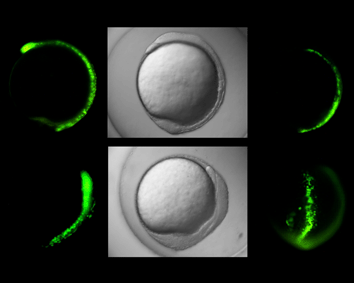Lab
Toshio Hirano Lab
|

|
Statement of Research Interest
Introduction:
The aim of this research project is to extend further our knowledge and experience obtained from the cytokine research and applied them to elucidation of the mechanisms by which cells of developing zebrafish or mice respond to secreted signaling factors including cytokines to specify cell fate and cell behavior, in particular axis determination, gastrulation, and regionalization. The formation of Spemann organizer is one of the most important steps in dorsoventral axis determination in vertebrate development. We have isolated a novel zebrafish homeobox gene, dharma, specifically expressed in Nieuwkoop center and essential for organizer formation and forebrain formation. The aim of this projects is the elucidation of the molecular mechanisms involved in organizer formation, gastrulation. We will apply the findings in zebrafish to mouse by performing gene-targeting of each responsible gene. The final goal of this project is the application of our findings to the understanding of the molecular mechanisms and control of human diseases.
Previous studies:
Our studies on cell cleavage after fertilaization have revealed that asymmetric p38 activation on one side of the blastodisc required for symmetric and synchronous cleavage (J. Cell Biol. 150:1335-1347, 2000). Our results suggest that dorsal determinants directly or indirectly induce asymmetric p38 activation which seems to be required for cleavage in only future dorsal side. to understand the molecular mechanisms of early development, we have identified several zebrafisf genes, such as dharma, dkk-1, ifez, fezl, pnx, and stat3. Among these two genes that are required for gastrulation, both of which are down stream of maternal Wnt/b-catenin pathway. We found that a novel zebrafish homeobox gene, dharma, which is induced by maternal Wnt/b-catenin pathway and capable of inducing the organizer ectopically (Genes & Development, 12: 2345-2353, 1998). Furthermore, dharma gene was found to be encoded by bozozok locus (Development, 126:1427-1438, 1999), establishing that dharma/bozozok is essential gene for gastrula organiser formation. In fact, dharma/boz and squint/nodal cooperatively induces organizer specific genes, such as goosecoid, chordin and dkk-1 (Mech. of Dev. 91, 293-303, 2000). We also found that Stat3 is activated in the dorsal region in a manner dependent on the maternal Wnt/b-catenin pathway. Most important finding is that Stat3 controls cell movements during gastrulation without affecting early cell fate specification (Developmental Cells, 2: 363-375, 2002).
Projects:
1. Identification and cloning of molecules involved in dharma-induced organizer formation, forebrain formation and neural development in zebra fish utilizing subtraction, expression cloning and mutagenesis. (zebrafish)
2. Elucidation of the roles of the gp130/JAK /STAT signal transduciton pathway in gastrulation cell movements and identification of the ligand for gp130 and targets genes of the JAK/STAT3 signals involved in cell movements. (zebrafish and mouse)
3. Elucidation of the roles of MAPK, JNK and p38 and upstream signaling molecules related to these MAP kinase family molecules in development. (zebrafish and mouse)
4. Identification of dorsal determinants. (zebrafish)
The aim of this research project is to extend further our knowledge and experience obtained from the cytokine research and applied them to elucidation of the mechanisms by which cells of developing zebrafish or mice respond to secreted signaling factors including cytokines to specify cell fate and cell behavior, in particular axis determination, gastrulation, and regionalization. The formation of Spemann organizer is one of the most important steps in dorsoventral axis determination in vertebrate development. We have isolated a novel zebrafish homeobox gene, dharma, specifically expressed in Nieuwkoop center and essential for organizer formation and forebrain formation. The aim of this projects is the elucidation of the molecular mechanisms involved in organizer formation, gastrulation. We will apply the findings in zebrafish to mouse by performing gene-targeting of each responsible gene. The final goal of this project is the application of our findings to the understanding of the molecular mechanisms and control of human diseases.
Previous studies:
Our studies on cell cleavage after fertilaization have revealed that asymmetric p38 activation on one side of the blastodisc required for symmetric and synchronous cleavage (J. Cell Biol. 150:1335-1347, 2000). Our results suggest that dorsal determinants directly or indirectly induce asymmetric p38 activation which seems to be required for cleavage in only future dorsal side. to understand the molecular mechanisms of early development, we have identified several zebrafisf genes, such as dharma, dkk-1, ifez, fezl, pnx, and stat3. Among these two genes that are required for gastrulation, both of which are down stream of maternal Wnt/b-catenin pathway. We found that a novel zebrafish homeobox gene, dharma, which is induced by maternal Wnt/b-catenin pathway and capable of inducing the organizer ectopically (Genes & Development, 12: 2345-2353, 1998). Furthermore, dharma gene was found to be encoded by bozozok locus (Development, 126:1427-1438, 1999), establishing that dharma/bozozok is essential gene for gastrula organiser formation. In fact, dharma/boz and squint/nodal cooperatively induces organizer specific genes, such as goosecoid, chordin and dkk-1 (Mech. of Dev. 91, 293-303, 2000). We also found that Stat3 is activated in the dorsal region in a manner dependent on the maternal Wnt/b-catenin pathway. Most important finding is that Stat3 controls cell movements during gastrulation without affecting early cell fate specification (Developmental Cells, 2: 363-375, 2002).
Projects:
1. Identification and cloning of molecules involved in dharma-induced organizer formation, forebrain formation and neural development in zebra fish utilizing subtraction, expression cloning and mutagenesis. (zebrafish)
2. Elucidation of the roles of the gp130/JAK /STAT signal transduciton pathway in gastrulation cell movements and identification of the ligand for gp130 and targets genes of the JAK/STAT3 signals involved in cell movements. (zebrafish and mouse)
3. Elucidation of the roles of MAPK, JNK and p38 and upstream signaling molecules related to these MAP kinase family molecules in development. (zebrafish and mouse)
4. Identification of dorsal determinants. (zebrafish)
Lab Members
| Hirata, Tsutomu Graduate Student | Nojima, Hideaki Graduate Student | Yabe, Taijirou Graduate Student |
